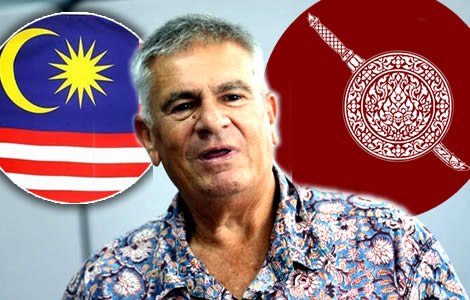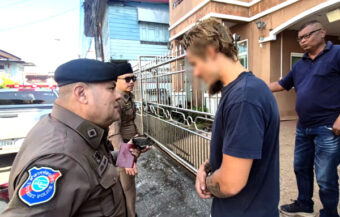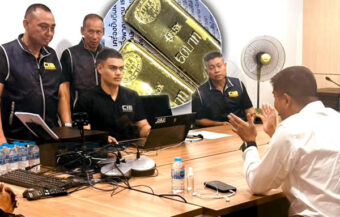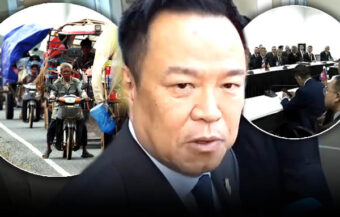Australian journalist Murray Hunter, 66, was pulled off a Bangkok flight over a Malaysian defamation complaint, held overnight in lockup, bailed for ฿20,000, and faces a November 17 court hearing, raising urgent questions about cross-border legal standing.
A 66-year-old Australian journalist was yanked off a plane last Monday at Bangkok’s Suvarnabhumi Airport and held overnight. The arrest followed a defamation complaint filed by a Malaysian government agency over his writings published in Thailand. Murray Hunter, bewildered by conflicting summonses and reports, spent the night in a lockup cell before posting ฿20,000 bail. He is set to appear in court on November 17, raising urgent questions about how a foreign government can push criminal defamation proceedings on Thai soil.

Australian journalist Murray Hunter, 66, says he was improperly arrested in Thailand over his criticism of Malaysia. On Thursday, he told The Associated Press that Thai police detained him last Monday at Suvarnabhumi Airport as he tried to board a flight to Hong Kong. Consequently, he spent a night in lockup before posting ฿20,000 ($620) bail. He is due back in court on November 17 to face criminal defamation charges.
Hunter is an independent scholar and online writer who has published critical articles about Malaysian government institutions. He explained that the arrest followed a complaint filed in Malaysia in 2024.
Accordingly, Thai police issued summonses for Hunter to appear and acknowledge the charges. However, he said he did not understand how Malaysian authorities could prosecute him while he resided in Thailand. Furthermore, Hunter revealed that police suggested one of the summonses he received may have been fake or connected to a scammer gang.
Murray Hunter’s arrest raises alarm about cross-border defamation enforcement by foreign regimes
Despite this, Hunter was prevented from boarding his flight. As a result, he spent a night in detention, highlighting the serious consequences of cross-border legal action. He described the experience as “extraordinary and perplexing,” questioning how Thai authorities could enforce a complaint originating from another country.
Hunter blamed the Malaysian Communications and Multimedia Commission for lodging the criminal defamation charge. A copy of his charge sheet seen by AP, identifies the agency as the injured party, but lists the complainant as an unnamed person staying at a Bangkok hotel.
Moreover, the commission confirmed that it filed police reports in 2024 in both Malaysia and Thailand concerning Hunter’s writings. It also initiated a civil lawsuit against him in Malaysia. Nonetheless, the commission said it would respect the decisions of the Thai justice system.
Hunter noted that one summons was delivered to his home while he was away in another region of Thailand. Consequently, local police advised him that the copy forwarded to him by a neighbour appeared to be fraudulent. Despite this warning, Thai authorities still acted on the summons, highlighting potential gaps in knowledge and procedure.
Case highlights flaws in Thai procedures and how foreign complaints can trigger the detention of journalists
The arrest raises urgent questions about Thailand’s criminal defamation laws. Specifically, critics note the unusual use of these laws in this case to prosecute an offence originating abroad. Indeed, criminal defamation statutes have been abolished or heavily restricted in most jurisdictions. Furthermore, the case highlights weaknesses in police understanding and the administration of such laws.
Observers suggest Hunter’s arrest is another example of rising transnational repression, a practice in which one country silences critics on behalf of another. Human rights groups and U.N. experts have repeatedly warned about such practices in Southeast Asia.
In July, a U.N. Human Rights Council report highlighted allegations of extrajudicial actions, enforced disappearances, and harassment involving Thailand, Laos, Cambodia, and Vietnam. Although all governments denied wrongdoing, the report highlighted growing concern about cross-border persecution.
Hunter told AP that his case is a warning for journalists across the region. “If this can happen to me, any journalist could be targeted if a foreign agency lodges a complaint with Thai police,” he said. Consequently, he warned that authorities could detain someone before boarding a flight and hold them in a lockup without clear justification.
Hunter’s case illustrates the rise of transnational repression and warns journalists of new risk
The Thai Foreign Ministry has declined to comment on the matter. Meanwhile, human rights organisations have voiced strong criticism. A joint statement from Malaysia’s Centre for Independent Journalism and PEN Malaysia said using Thai authorities to enforce Malaysia’s restrictions violates constitutional protections for free speech. They added that such overreach undermines legal systems in both countries.
Hunter’s criminal defamation charge carries a maximum penalty of two years in prison and a fine of ฿200,000 ($6,180). In addition, he said the case is politically motivated and challenges the legitimacy of any prosecution under Thai law.
Furthermore, he has appealed to the United Nations, posting to the Commission of Southeast Asian countries about his case. He described it as part of a growing pattern of transnational repression aimed at silencing critics and dissidents.
Rights experts note that cases like Hunter’s illustrate the challenges of journalism in the digital era. Content crosses borders easily, but legal protections vary widely. Moreover, such cases create chilling effects, discouraging journalists from covering sensitive topics. Consequently, the Hunter case has drawn international attention, raising questions about Thailand’s role in cross-border enforcement and the rights of journalists abroad.
Free speech concerns while exposing the vulnerabilities of journalists in a digitally connected world
Legal analysts point out that countries generally retain sovereignty over their own criminal laws. However, extending jurisdiction to foreign nationals based on complaints filed elsewhere is highly unusual.
Furthermore, Hunter’s case could set a precedent for how Thailand addresses cross-border defamation claims. Its outcome may determine the limits of transnational legal cooperation in Southeast Asia.
Ben Smith money fixer to the elite in Thailand lines up ฿100M defamation case against Rangsiman Rome
Hun Sen’s mask falls. Speech on Friday clearly showed deliberate ill will to collapse Thailand’s democracy
Hunter’s court appearance on November 17 will be closely watched by journalists, human rights advocates, and international legal experts. If convicted, it could embolden similar actions against critics in other countries.
Conversely, a dismissal might reinforce the principle that cross-border defamation complaints should not override national legal protections. Either way, the case highlights vividly both the powerful role and vulnerabilities of independent journalists in a globalised, digitally connected world.
Join the Thai News forum, follow Thai Examiner on Facebook here
Receive all our stories as they come out on Telegram here
Follow Thai Examiner here
Further reading:
Leader of deadly scam gang in Cambodia and henchmen still at large with 4 more Thais arrested
Police in Cambodia close in on fake scam loan app leadership after family murders in Samut Prakan
Cambodian cybercrime industry run by Chinese criminals could be generating up to 38% of its GDP
Debt and ฿1.7 million loss to scammers drive man to murder his wife and two sons in Samut Prakan
Loan shark arrested in Nonthaburi for bullying a borrower charged an annual interest rate of 730%
Bank of Thailand to tackle household debt in new plan from 2024 which will see higher standards
Politicians skating on thin ice as the economy may not be able to withstand a political stalemate
Debt crisis may be one of the top items on the new cabinet’s agenda as central bank stands ready
Potential hazard lights flashing as kingdom’s auto loans spiral into default with sky-high borrowing
Bank of Thailand governor gives veiled warning to voters on the danger posed by populist policies


















